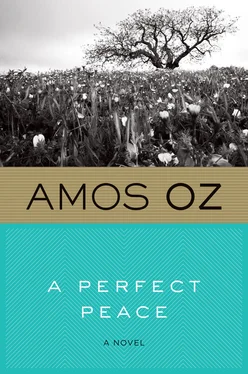"And then what?"
"Nothing. The old man called them psychopaths and said that no one was with him. That they must have been seeing things. He even waved a pistol at them and swore at their mothers."
"And then?"
"Nothing. They just drove off."
"And your man? He's sure it was Yonatan?"
"No. He just thinks it might well have been."
"What do you intend to do about it?"
"Nothing now except poke around a little more down there. If he's alive and in the country, you can count on us to get him. Just give us time."
"And the old man?"
"Forget it, Srulik. I tell you, that whole desert down there is swarming with freaks. This whole country, in fact. How the hell would anyone know? This Yotam is slightly spaced-out himself. A year ago he told me he'd seen a lion in Gravel Gulch. And he's into ghosts and Ouija boards too. For my money, Srulik, we've got the highest percentage of nuts of any country on earth. Take care. And not a word to his parents about this."
After Chupka had departed, Srulik went to sit alone for a while in his office. It was hot and the mosquitoes were out in full force. If there really is a Higher Being, he mused, whether God or Whatever, I personally beg to differ with Him, or that Being, on several issues, some of them quite fundamental. He could have done everything in a far better way. But what I most dislike about Him, if I may say so, is His cheap, vulgar sense of humor. What He finds amusing is unbearably painful to us. If He gets such pleasure from our suffering, then He and I are in deep disagreement. It's almost eight o'clock and the general meeting's at nine. I'd better start going over the agenda right now.
On the fourth of May, at two in the morning, in the ruins of Sheikh Dahr, Chupka's men caught the murderer who had broken out of the prison not far from Kibbutz Granot some four months before. They found him sleeping like a baby in the sheikh's abandoned house, tied his hands behind his back with his shirt, and marched him off to the Afula police station. There, after vigorous questioning, Captain Bechor was finally satisfied that this client had never encountered Yonatan Lifshitz. All this time he had been living off the land, poaching chickens, stealing oranges from the citrus groves, drinking water from irrigation pipes. From time to time, too, he confessed, he was supplied with fresh clothes, matches, and even a bottle of arak by Bolognesi, who had come to know him in prison many years before. If you'd like, said Bechor, we can give that crackpot the third degree as well. No, thank you, said Srulik. Don't bother. Bolognesi is harmless. Leave him alone.
The tractor shed was now being run by Azariah Gitlin. He had a hired hand to help him. It had taken all of Srulik's influence to get the young mechanic's candidacy for membership approved at a general meeting, and since that time, Azariah's garrulousness had somewhat diminished. Only rarely would he inform Yashek and Little Shimon over breakfast that there is no embarrassment like a bad comparison or remind Etan R. of what Spinoza already knew hundreds of years ago, namely, that we must accept all things with serenity because fate in all its manifestations is as much the product of Eternal Decree as the sum total of the angles of a triangle must always be one-hundred-and-eighty degrees.
If someone prodded Azariah these days to hurry up and finish working on the combines before the barley harvest began, he would stick his hands in his pockets and drawl in the lazy voice he had picked up from Udi Shneour, "Haste killed the bear, my friend. Why don't you just leave it to me."
Yet he started the day before any of the others, rising at four with the first chill light, and put on the beat-up brown jacket Rimona had fixed for Yonatan. Now and then the two of them spent their evenings at Udi and Anat's or with Etan R. and his girlfriends in their room by the swimming pool. At such times Azariah not only played his guitar but felt free to air his political views. He also found time to turn the earth behind the house with a pitchfork and plant it with sweet peas, and to look after Yolek and Hava's garden as well. There he cheerfully hoed, raked, pruned, and mowed, fertilized chemically and organically, planted everything from cactuses to carnations, and decorated the fences with various gears, pistons, and other pieces of junk taken from the discard pile in the tractor shed.
Every day after breakfast, before returning to work, Azariah would sit for about ten minutes with Yolek under his fig tree, reading aloud from the headline news of the morning paper. Yolek didn't hear a word, since he loathed his new hearing aid and refused to wear it. Laying a large, leathery hand on the back of Azariah's, he might ask, with a trace of wonder, "Eh? What was that? What's new?" Or declare sadly, "Berl was an old fox himself." Or else, "No question about it, Stalin never liked us."
Azariah would straighten Yolek's knit woolen knee wrap before returning to the tractor shed. He saw to it that the vet who visited the kibbutz every two weeks gave Tia her annual injection, reconditioned and painted an old wheelchair in case Yolek should need it, and accompanied Rimona to Haifa to buy her maternity clothes. On that occasion he bought her a little English book from India on reincarnation and the way to inner peace.
He worked hard in the tractor shed and ran it well. By the time the barley harvest was at hand, the combines were not only ready but freshly cleaned and painted till they gleamed. During the first week of May Azariah sent a brief letter to the Prime Minister, assuring Comrade Eshkol that, despite the ridicule and ugly jokes at his expense, many of the common people loved him. Eshkol responded immediately in his own hand on an ordinary postcard. "Thank you, young man," it said. "You have bolstered my spirits greatly. Do not forget to pay my respects to Yolek and Hava. All the best."
Srulik continued to play his flute whenever he had the time, which was only at night. Hava had long since moved out of his rooms and ceased being a burden, but all day long he was being buttonholed on the paths of the kibbutz, or dropped in on at his office, by people with problems or requests. Would he please use his influence to help get them into or out of this or that job? Would he please be so good as to take this or that stand on this or that economic or educational issue? He made himself a little notebook in which to jot down each petition, crossing them out one by one as they were dealt with. Not until night came was there ever any time for writing or music. Yet wonders did not cease. It was said that Paula Levin, one of the original founding members of the kibbutz and a kindergarten teacher of long standing who headed the tots committee, had received an album of Diirer reproductions from Srulik out of the blue. What could such a gift mean?
What a pity Yolek's new hearing aid was gathering dust in a drawer along with his glasses. The man simply did not want to hear. Or to see. What a wreck his face had become. And the splendid spring had only made his hay fever worse. His breathing was loud and labored, and though he had stopped smoking altogether, his allergy often brought tears to his eyes. Few things could arouse in him anything more than a blank stare. Even when his young son Amos informed him that he planned to marry his girlfriend in the fall and had made up his mind to leave the kibbutz and join the professional army, Yolek's only response was " Shoyn. Fine. Never mind."
A letter from Trotsky arrived one day. It was not addressed to Yolek this time, but to the new secretary. He was sorry to say that he had still not heard from his son. In vain he had waited, but still refused to give up hope. And never would. Why should he? His only brother had vanished twenty years ago, yet he had not despaired of him either. All things were possible. Would Srulik agree on behalf of the kibbutz to accept a donation for the construction of a music room? Or perhaps a library or lecture hall? He beseeched the secretary not to turn him down. He was a lonely man, and no longer young. God only knew how many years he had left. And it was on Kibbutz Granot, in spite of everything, that he had spent the best days of his life and fathered his only child.
Читать дальше












